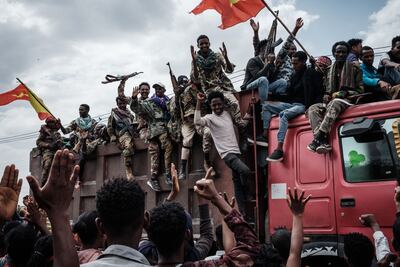More than 500 UN peacekeepers from Ethiopia's Tigray region who asked for political asylum in Sudan have refused to return home, AFP reported.
Until last year, Ethiopian forces accounted for the majority of the 4,000-member United Nations Interim Security Force for Abyei mission in the disputed border region between Sudan and South Sudan.
Most of the Ethiopian forces returned home after the contingent was replaced by a multinational force following a breakdown in relations between Ethiopia and Sudan.
But hundreds have now requested asylum, a UN peacekeeping representative told AFP in New York.
“A number of peacekeepers have chosen not to return and are seeking international protection. They are being protected by the UN in a secure location,” the representative said.
“The responsibility to grant asylum lies with the Sudanese authorities, who are being assisted by the United Nations High Commissioner for Refugees (UNHCR) in receiving these individuals.”
Ties between Ethiopia and Sudan have deteriorated because of a territorial dispute and Ethiopia's dam project on the Blue Nile, which Sudan fears will threaten its access to water.
A total of 528 Ethiopian soldiers from Tigray requested asylum in Sudan, according to Maj Gebre Kidane, a Tigrayan former peacekeeper. The figure was confirmed by two other peacekeepers contacted by AFP.
“It's not secure to go back to Ethiopia and we want to be the voice of the people of Tigray” before the international community, the 40-year-old told AFP from Abyei, explaining his decision to apply for asylum in March.
Since Ethiopian Prime Minister Abiy Ahmed sent troops into Tigray in November 2020 in response to what he said were rebel attacks on army camps, the conflict has divided the multi-ethnic nation.
An early victory against the Tigray People's Liberation Front (TPLF), which ruled Ethiopia for nearly 30 years until 2018, was followed by a rebel comeback last June, when they took back control of Tigray and expanded into neighbouring regions.
Since then, the war has dragged on, with essential services shut in Tigray for several months while aid trickles in after both sides agreed to a conditional humanitarian truce in March.
The region of six million people, about six per cent of Ethiopia's population, has been under a de facto blockade, according to the UN.
Tigrayan officers were purged from federal army ranks soon after the war started, while ordinary Tigrayans have described being subjected to arbitrary arrests in Addis Ababa, the Ethiopian capital.
“Peacekeepers from Tigray previously went back to Ethiopia. Some of them were arrested, some killed,” said Gebre Kidane, who has been based in Abyei since July 2020.
“The people of Tigray have been living in darkness, and the international community is watching in silence. We want to make the international community pay attention.”
The Ethiopian government did not respond to AFP's calls for comment on the troops' request for asylum.
The Al Barzakh Festival takes place on Wednesday and Thursday at 7.30pm in the Red Theatre, NYUAD, Saadiyat Island. Tickets cost Dh105 for adults from platinumlist.net
Fixture and table
UAE finals day: Friday, April 13 at Rugby Park, Dubai Sports City
- 3pm, UAE Conference: Dubai Tigers v Sharjah Wanderers
- 6.30pm, UAE Premiership: Dubai Exiles v Abu Dhabi Harlequins
UAE Premiership – final standings
- Dubai Exiles
- Abu Dhabi Harlequins
- Jebel Ali Dragons
- Dubai Hurricanes
- Dubai Sports City Eagles
- Abu Dhabi Saracens
COMPANY PROFILE
Name: Grubtech
Founders: Mohamed Al Fayed and Mohammed Hammedi
Launched: October 2019
Employees: 50
Financing stage: Seed round (raised $2 million)
Our Time Has Come
Alyssa Ayres, Oxford University Press
TECH%20SPECS%3A%20APPLE%20IPHONE%2014%20PLUS
%3Cp%3E%3Cstrong%3EDisplay%3A%3C%2Fstrong%3E%206.1%22%20Super%20Retina%20XDR%20OLED%2C%202778%20x%201284%2C%20458ppi%2C%20HDR%2C%20True%20Tone%2C%20P3%2C%201200%20nits%3C%2Fp%3E%0A%3Cp%3E%3Cstrong%3EProcessor%3A%3C%2Fstrong%3E%20A15%20Bionic%2C%206-core%20CPU%2C%205-core%20GPU%2C%2016-core%20Neural%20Engine%C2%A0%3C%2Fp%3E%0A%3Cp%3E%3Cstrong%3EMemory%3A%3C%2Fstrong%3E%206GB%3C%2Fp%3E%0A%3Cp%3E%3Cstrong%3ECapacity%3A%3C%2Fstrong%3E%20128%2F256%2F512GB%3C%2Fp%3E%0A%3Cp%3E%3Cstrong%3EPlatform%3A%3C%2Fstrong%3E%20iOS%2016%3C%2Fp%3E%0A%3Cp%3E%3Cstrong%3EMain%20camera%3A%3C%2Fstrong%3E%20Dual%2012MP%20main%20(f%2F1.5)%20%2B%2012MP%20ultra-wide%20(f%2F2.4)%3B%202x%20optical%2C%205x%20digital%3B%20Photonic%20Engine%2C%20Deep%20Fusion%2C%20Smart%20HDR%204%2C%20Portrait%20Lighting%3C%2Fp%3E%0A%3Cp%3E%3Cstrong%3EMain%20camera%20video%3A%3C%2Fstrong%3E%204K%20%40%2024%2F25%2F3060fps%2C%20full-HD%20%40%2025%2F30%2F60fps%2C%20HD%20%40%2030fps%3B%20HD%20slo-mo%20%40%20120%2F240fps%3B%20night%2C%20time%20lapse%2C%20cinematic%2C%20action%20modes%3B%20Dolby%20Vision%2C%204K%20HDR%3C%2Fp%3E%0A%3Cp%3E%3Cstrong%3EFront%20camera%3A%3C%2Fstrong%3E%2012MP%20TrueDepth%20(f%2F1.9)%2C%20Photonic%20Engine%2C%20Deep%20Fusion%2C%20Smart%20HDR%204%3B%20Animoji%2C%20Memoji%3B%20Portrait%20Lighting%3C%2Fp%3E%0A%3Cp%3E%3Cstrong%3EFront%20camera%20video%3A%3C%2Fstrong%3E%204K%20%40%2024%2F25%2F3060fps%2C%20full-HD%20%40%2025%2F30%2F60fps%2C%20HD%20slo-mo%20%40%20120fps%3B%20night%2C%20time%20lapse%2C%20cinematic%2C%20action%20modes%3B%20Dolby%20Vision%2C%204K%20HDR%3C%2Fp%3E%0A%3Cp%3E%3Cstrong%3EBattery%3A%3C%2Fstrong%3E%204323%20mAh%2C%20up%20to%2026h%20video%2C%2020h%20streaming%20video%2C%20100h%20audio%3B%20fast%20charge%20to%2050%25%20in%2030m%3B%20MagSafe%2C%20Qi%20wireless%20charging%3C%2Fp%3E%0A%3Cp%3E%3Cstrong%3EConnectivity%3A%3C%2Fstrong%3E%20Wi-Fi%2C%20Bluetooth%205.3%2C%20NFC%20(Apple%20Pay)%3C%2Fp%3E%0A%3Cp%3E%3Cstrong%3EBiometrics%3A%3C%2Fstrong%3E%20Face%20ID%3C%2Fp%3E%0A%3Cp%3E%3Cstrong%3EI%2FO%3A%3C%2Fstrong%3E%20Lightning%3C%2Fp%3E%0A%3Cp%3E%3Cstrong%3ECards%3A%3C%2Fstrong%3E%20Dual%20eSIM%20%2F%20eSIM%20%2B%20SIM%20(US%20models%20use%20eSIMs%20only)%3C%2Fp%3E%0A%3Cp%3E%3Cstrong%3EColours%3A%3C%2Fstrong%3E%20Blue%2C%20midnight%2C%20purple%2C%20starlight%2C%20Product%20Red%3C%2Fp%3E%0A%3Cp%3E%3Cstrong%3EIn%20the%20box%3A%3C%2Fstrong%3E%20iPhone%2014%2C%20USB-C-to-Lightning%20cable%2C%20one%20Apple%20sticker%3C%2Fp%3E%0A%3Cp%3E%3Cstrong%3EPrice%3A%3C%2Fstrong%3E%20Dh3%2C799%20%2F%20Dh4%2C199%20%2F%20Dh5%2C049%3C%2Fp%3E%0A
Match info
Wolves 0
Arsenal 2 (Saka 43', Lacazette 85')
Man of the match: Shkodran Mustafi (Arsenal)
UAE currency: the story behind the money in your pockets
The biog
Date of birth: 27 May, 1995
Place of birth: Dubai, UAE
Status: Single
School: Al Ittihad private school in Al Mamzar
University: University of Sharjah
Degree: Renewable and Sustainable Energy
Hobby: I enjoy travelling a lot, not just for fun, but I like to cross things off my bucket list and the map and do something there like a 'green project'.
The specs: 2018 Mitsubishi Eclipse Cross
Price, base / as tested: Dh101,140 / Dh113,800
Engine: Turbocharged 1.5-litre four-cylinder
Power: 148hp @ 5,500rpm
Torque: 250Nm @ 2,000rpm
Transmission: Eight-speed CVT
Fuel consumption, combined: 7.0L / 100km
Dust and sand storms compared
Sand storm
- Particle size: Larger, heavier sand grains
- Visibility: Often dramatic with thick "walls" of sand
- Duration: Short-lived, typically localised
- Travel distance: Limited
- Source: Open desert areas with strong winds
Dust storm
- Particle size: Much finer, lightweight particles
- Visibility: Hazy skies but less intense
- Duration: Can linger for days
- Travel distance: Long-range, up to thousands of kilometres
- Source: Can be carried from distant regions
Rock in a Hard Place: Music and Mayhem in the Middle East
Orlando Crowcroft
Zed Books


